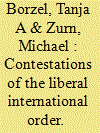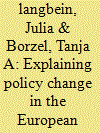|
|
|
Sort Order |
|
|
|
Items / Page
|
|
|
|
|
|
|
| Srl | Item |
| 1 |
ID:
178552


|
|
|
|
|
| Summary/Abstract |
The 1990s saw a systemic shift from the liberal post–World War II international order of liberal multilateralism (LIO I) to a post–Cold War international order of postnational liberalism (LIO II). LIO II has not been only rule-based but has openly pursued a liberal social purpose with a significant amount of authority beyond the nation-state. While postnational liberal institutions helped increase overall well-being globally, they were criticized for using double standards and institutionalizing state inequality. We argue that these institutional features of the postnational LIO II led to legitimation problems, which explain both the current wave of contestations and the strategies chosen by different contestants. We develop our argument first by mapping the growing liberal intrusiveness of international institutions. Second, we demonstrate the increased level and variety of contestations in international security and international refugee law. We show that increased liberal intrusiveness has led to a variety of contestation strategies, the choice of which is affected by the preference of a contestant regarding postnational liberalism and its power within the contested institution.
|
|
|
|
|
|
|
|
|
|
|
|
|
|
|
|
| 2 |
ID:
095014


|
|
|
|
|
| Publication |
2010.
|
| Summary/Abstract |
This article sheds light on the European Union's (EU) efforts to facilitate the fight against corruption and promote good governance through the European Neighbourhood Policy (ENP). Our analysis shows that the level of corruption in the Eastern Neighbourhood is strongly connected to the success of democratic and economic reforms. The ENP theoretically corresponds to the complex nature of the phenomenon by placing equal emphasis on strengthening state institutions, restructuring the economy, and pushing for democratic reforms. As the EU, however, by and large seeks cooperation with state actors and pursues a 'one-size-fits-all' approach mostly based on 'soft' mechanisms such as socialisation and capacity-building, the implementation of politically sensitive reforms seems to be unlikely. Moreover, the EU potentially allows its partner governments to 'pick and chose' from the overall reform agenda and evade real political and economic change towards better governance.
|
|
|
|
|
|
|
|
|
|
|
|
|
|
|
|
| 3 |
ID:
120677


|
|
|
|
|
| Publication |
2013.
|
| Summary/Abstract |
This Introduction discusses the conventional wisdoms dominating the scholarship on policy change in the EU's Eastern neighbourhood countries and summarises the major findings of this collection. Drawing upon the empirical evidence underpinning the contributions to our collection, we argue that compliance with or convergence to EU policies happens despite high costs, limited capacities and the lack of EU membership prospects. We also challenge country-level or policy-type explanations that emphasise membership aspirations, asymmetric interdependencies between the EU and the neighbourhood countries, or the level of politicisation or institutionalisation characterising particular policy fields. Finally, our findings point towards important differences between membership, accession and neighbourhood Europeanisation by stressing factors mediating the EU's impact on policy change in the Eastern neighbourhood countries that played a rather marginal role in domestic policy change in EU member states and accession countries.
|
|
|
|
|
|
|
|
|
|
|
|
|
|
|
|
| 4 |
ID:
120678


|
|
|
|
|
| Publication |
2013.
|
| Summary/Abstract |
The literature on European Union enlargement has identified misfit and membership conditionality as two factors that decisively shape the effectiveness of EU policy transfer to the Central and Eastern European accession countries. Thus, European neighbourhood countries would seem to be less likely cases of EU-induced policy change. Yet, rather than inertia or resistance, we find that European neighbourhood countries comply with some but not with other EU policies. Our essay investigates such policy-specific variation in the compliance patterns of Georgia and Armenia that give rise to differential policy change. Comparing the fight against corruption, migration and energy policy, we argue that policy-specific conditionality and preferential fit are the main factors accounting for the EU's differential policy impact in European neighbourhood countries.
|
|
|
|
|
|
|
|
|
|
|
|
|
|
|
|
| 5 |
ID:
126628


|
|
|
|
|
| Publication |
2013.
|
| Summary/Abstract |
The European Union has developed a one-size-fits-all approach to promote good governance reforms in African countries, focusing on strengthening the effectiveness of state institutions while increasingly asking for reforms that also target their democratic quality. Assessing the EU's policies in Angola and Ethiopia reveals, however, that the implementation of this approach is more differential. While the EU has a hard time making the two governments address governance issues, it has been more successful in implementing its policy approach in Ethiopia than in Angola. These differences are largely explained by these countries' different degrees of interdependency with the EU rather than differences in stability and democracy. Unlike Angola, Ethiopia heavily relies on EU development aid, giving the EU greater leverage to push for governance reforms. While conditionality is more effective in making African governments address governance issues, it undermines the legitimacy of the EU's development cooperation, which emphasizes partnership and ownership.
|
|
|
|
|
|
|
|
|
|
|
|
|
|
|
|
|
|
|
|
|